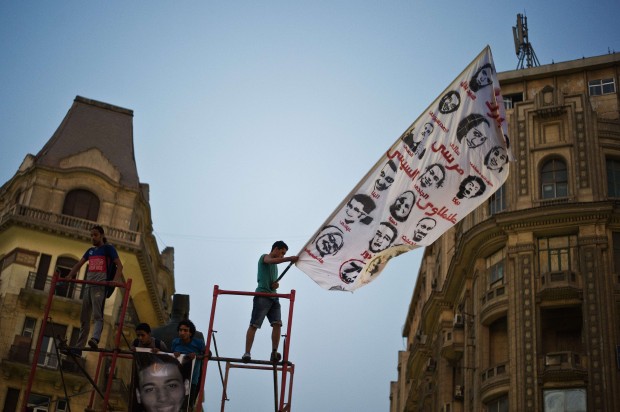
Egyptian 6th of April movement members protest against the renewal of the state of emergency during a demonstration on September 16, 2013 in downtown Cairo (TOPSHOTS/AFP PHOTO/GIANLUIGI GUERCIA)
Egyptian government spokesman Ihab Badawi said Saudi Arabia and the United Arab Emirates played an important role in explaining to the world what had actually happened in Egypt following the ouster of Mursi.
Badawi told Asharq Al-Awsat that the country was “making great progress in the fight against terrorism in Sinai.” He added that there were a number of economic projects planned by the government because “there was a link between the economic and security situations,” and that he hoped the tourism industry would be revived as it represented one of the main financial resources for Egypt and employs four million Egyptians.
Badawi said “the road map, or the map to the future, was going ahead and was being implemented according to the specified time frame.”
On international level, Badawi said Egypt was subjected to criticism, especially by the US and Europe, following the ouster of Mursi, widely-described as a “military coup” in those countries.
Meanwhile, Prime Minister Hazim El-Beblawi denied yesterday that politically-motivated arrests took place in Egypt. He said the instances of civilians being tried in military courts were isolated incidents, which were related to attacks on the armed forces or on military installations.
Beblawi said the extension of the state of emergency in the country was enforced for security reasons because of the recent “acts of terror and violence” in the country, which included the attempt on the life of the interior minister and the killing of 25 soldiers in Rafah. Beblawi said the government was working hard on restoring security and stability, and would remove the state of emergency as soon as possible.
In the meantime, Egyptian Foreign Minister Nabil Fehmi said during his visit to Russia—scheduled to end Tuesday—that the security operations in Sinai, especially the demolition of tunnels, aimed at ending smuggling operations.
Egyptian minister of social solidarity, Ahmed El-Bura’i, said he met the US Ambassador to Switzerland during his visit to Geneva last week. He said he noted a change in US position on Egypt, especially following recent comments by EU foreign relations chief, Catherine Ashton, about her intention to visit Cairo and that she supported the on-going democratic change in Egypt.

Implementation of democracy should be based on solid foundations which reflect the ambitions and aspirations of citizens rather than subject to the approval of the US or Europe. Fortunately Egypt is moving in the right direction and it is hoped sooner than later democratic traditions will be restored to the satisfaction and fulfillment of the Egyptian citizens. The right to vote should not be under duress nor confined to any particular ideology, as it happened in May of 2012. Moreover counting and declaration of votes should be under the control of a separate commission or body that should function independently. Though Egypt remains basically Islamic, secular and democratic traditions should be given prominence while the Coptic Church and the Institution of Al Azhar should be assigned their historic roles in guiding the destiny of citizens. Freedom of worship and belief for the celestial faiths should be enshrined in the constitution. Religious practices which do not conform with Abrahamic traditions should be confined to the privacy of homes.Social, economic and educational opportunities should be universal while the army should be a national institution.